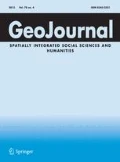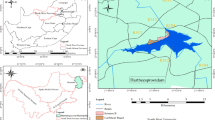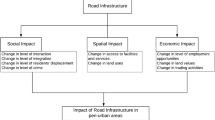Abstract
The urbanisation of poverty has seen ballooning livelihoods of the poor in contemporary cities as shown by proliferation of urban informality. These livelihoods are mushrooming against a background of repressive city regulatory frameworks that are aimed to stunt the development of urban informality. These repressive regulations have been denying the urban informality their right to the city. However, urban informality in the city of Masvingo has been growing despite these restrictive regulatory frameworks. The study examined how urban informality in the city of Masvingo has been asserting their right to the city in a city that has very hostile regulatory framework. The study utilised a qualitative approach to the inquiry, where in-depth interviews and field observations were employed. The study found out that the city of Masvingo has several instruments that are disenfranchising urban informality of their right to the city. These have been employed to remove informal traders from the city centre. However informal traders are also fighting from various fronts to assert their right to the city. They make use of political influence, employ militant ways, organise themselves into groups for taking over underutilized spaces in the city. The research therefore recommends that the city of Masvingo should employ pro-poor and inclusive urban development policies that should see the integration of urban informality in their mainstream economy. This should result in participation of informal traders in the development of the city and allow them to enjoy right to the city. This study will contribute to the growing scholarly work on the informal urbanism, especially the various ways they are using to assert their right to the city. Urban informality is known in many cities of the global South, for their exclusion in development cities, but this study is showing how informal traders are asserting their right to the city.

Source: Survey (2019)

Source: survey (2019)

Source: Survey (2019)

Source: Survey (2019)
Similar content being viewed by others
References
Alijev, H. (2015). Post-Soviet informality: Towards theory building. International Journal of Sociology and Social Policy, 35(3/4), 182–198.
Baker J, Schuyler N (2004), Analysing urban piverty: A summary of methods and approaches, World Bank Policy Research Working Paper no.3399.
Boer, R.W, de Vries, J., 2009, The right to the city as a tool for urban social movements: The case of Barceloneta, A paper presented at the 4th International conference of international Forum on Urbanism: The new urbanism question urbanism beyond neo-liberalism, 2009 Amsterdam.
Chigwenya, A. (2019). Contestations for urban spaces; Informality and institutions of disenfranchisement in Zimbabwe: The case of Masvingo city. Geo Journal. https://doi.org/10.1007/s10708-019-10022-4
Coggin, T., & Pieterse, M. (2012). Right and the city: An exploration of interaction between socio-economic rights and the city. Urban Forum, 23(3), 257–278.
Connor, M. (2015) Uniting citizens after united: Cities, neo-liberalism, and democracy. American Studies, 54(1), 5–27.
Fainstein, S. S. (2005). Planning theory and the city. Journal Planning Education and Research, 25(2), 121–130.
Fields, G. S. (1990). Labour markets and urban informal sector: Theory and evidence. In D. Turnham, B. Salome, & S. Schwarz (Eds.), The informal sector revisited (pp. 49–69). UK: OECD.
Fisher, R., Katiya, Y., Reid, C., & Shragge, E. (2013). We are radical: The right to the city alliance and the future community organization. Journal of Sociology and Social Welfare, 40(1), 156–182.
Gerxhani, K. (2004). The informal sector in developed and less developed countries: A literature review. Public Choice, 20(7), 267–300.
Government of Zimbabwe. (2002). Small. Micro and Medium Enterprise.
Gulsoni, K. N., & Pedroni, T. C. (2011). Neoliberalism, cities and education in the global South. Discourse Studies in Cultural Politics of Education, 32(2), 165–169.
Gunsilins, E., Spies, S., & Garcia-Cortes, S. (Eds.). (2011). Recovering resources, creating opportunities, integrating the informal sector into solid waste management. Duetsche Gesellschaft.
Harvey, D. (2008). The right to the city. New Left Review, 53(September–October), 23–40.
Harvey, D. (2003). Debates and development. The right to the city. International Journal of Urban and Regional Research, 27(4), 9–44.
Harvey, D. (2012). Rebel cities, from the right to the city to urban revolution. Verso Books.
Huchzermeyer, M. (2011). Cities with slums: From informal settlement eradication to a right to the city in Africa. UCT Press.
ILO. (2000). Employment and social protection in the informal sector. ILO.
Kamete, A. Y. (2013). On handling urban informality in Southern Africa. Geografrisken Annaler B, Human Geography, 95(1), 17–31.
Kamete, A. Y. (2007). Cold hearted, negligent and spineless? Planning, planners and the rejection of filth in urban Zimbabwe. International Planning Studies, 12(2), 153–171.
Lefebvre, H. (1968). Le Droita la Ville(The right to the city). Antropos.
Lefebvre, H. (1991). The production of urban space. Blackwell.
Lefebvre, H. (1996). Writings on cities. Blackwell.
McCann, E. J. (2002). Space, citizenship and Right to the city: A brief overview. Geojournal, 58(2/3), 77–79.
Marcuse, P. (2009). From critical urban theory to right to the city: Analysis of urban trends. Culture, Theory, Policy Action, City, 13(2–3), 175–197.
Miraftab, F., & McConnell, E. D. (2008). Multiculturalism and rural towns: Insights for inclusive planning. International Planning Studies, 13(4), 343–360.
Morgan, E., & Cole-Hawthorne, R. (2016). Applying the shared understanding between aboriginal and Western knowledge to challenge unsustainable neo-liberal planning policies and practices. Australian Planner, 53(1), 54–62.
Purcell, M. (2013). Possible worlds: Henry Lefebvre and the right to the city. Journal of Urban Affairs, 36(1), 141–154.
Romatet, E. (1983). Calcutta’s informal sector: Theory and reality. Economic and Political Weekly, 18(50), 2115–2128.
Roy, A. (2005). Urban informality: Towards an epistemology of planning. Journal of American Planning Association, 71(2), 147–158.
Roy, A. (2009). Why India cannot plan its cities: Informality, insurgence, and the Idiom of urbanization. Planning Theory, 8(1), 76–87.
Sandercock, L. (1998). Towards Cosmo polis. Planning for multicultural cities.
Saumngweme, T., Matsvai, S., & Sakuhuni, R. (2014). Econometric analysis of employment, output and growth of the informal sector in Zimbabwe, (1985–2013). International Journal of Economics Research, 52, 1–9.
Sherifat, Y. O. (2011). A theoretical analysis of the concept of informal economy and informality in developing countries. European Journal of Social Sciences, 20(4), 624–636.
Simone, A. (2005). Right to the city intervention. International Journal of Post- Colonial Studies, 7(3), 321–525.
Therkildsen, H. P., Hansen, C. T., & Lorentzen, A. (2009). The experience economy and the transformation of urban governance and planning. European Planning Studies, 17(4), 925–941.
UN-Habitat. (2005). Urban policies and the right to the city. A UN discussion paper.
UN-Habitat. (2010a). Planning Sustainable cities. Un-HABITAL Practices and Perspectives.
UN-HABITAT. (2010b). Land in support of sustainable urbanisation,: Proceedings of third African Ministerial conference on housing and urban development, Bamako, Mali, 22–24 November 2010.
UN-Habitat. (2012). Sustainable housing for sustainable cities: A policy framework for developing countries. Nairobi.
UN-Habitat. (2017). New Urban Agenda. Quito declaration on sustainable cities and human settlements for all.
Wang, Y. P. (2000). Housing reforms and its impacts on urban poor in China. Housing Studies, 15(6), 845–864.
Waterhout, B., Othengrafen, F., & Sykes, O. (2013). Neo-liberalisation process and spatial planning in France, Germany and Netherlands. An exploration, Planning Practice and Research, 28(1), 141–159.
Watson, V. (2007). The usefulness of normative planning theory in the context of Sub-Saharan Africa. Planning Theory, 1(1), 27–52.
Author information
Authors and Affiliations
Corresponding author
Ethics declarations
Conflict of interest
The author declares that they have no conflict of interest.
Additional information
Publisher's Note
Springer Nature remains neutral with regard to jurisdictional claims in published maps and institutional affiliations.
Rights and permissions
About this article
Cite this article
Chigwenya, A. Informality and the fight for rights to the city in Masvingo city, Zimbabwe. GeoJournal 87, 2817–2833 (2022). https://doi.org/10.1007/s10708-021-10399-1
Accepted:
Published:
Issue Date:
DOI: https://doi.org/10.1007/s10708-021-10399-1




